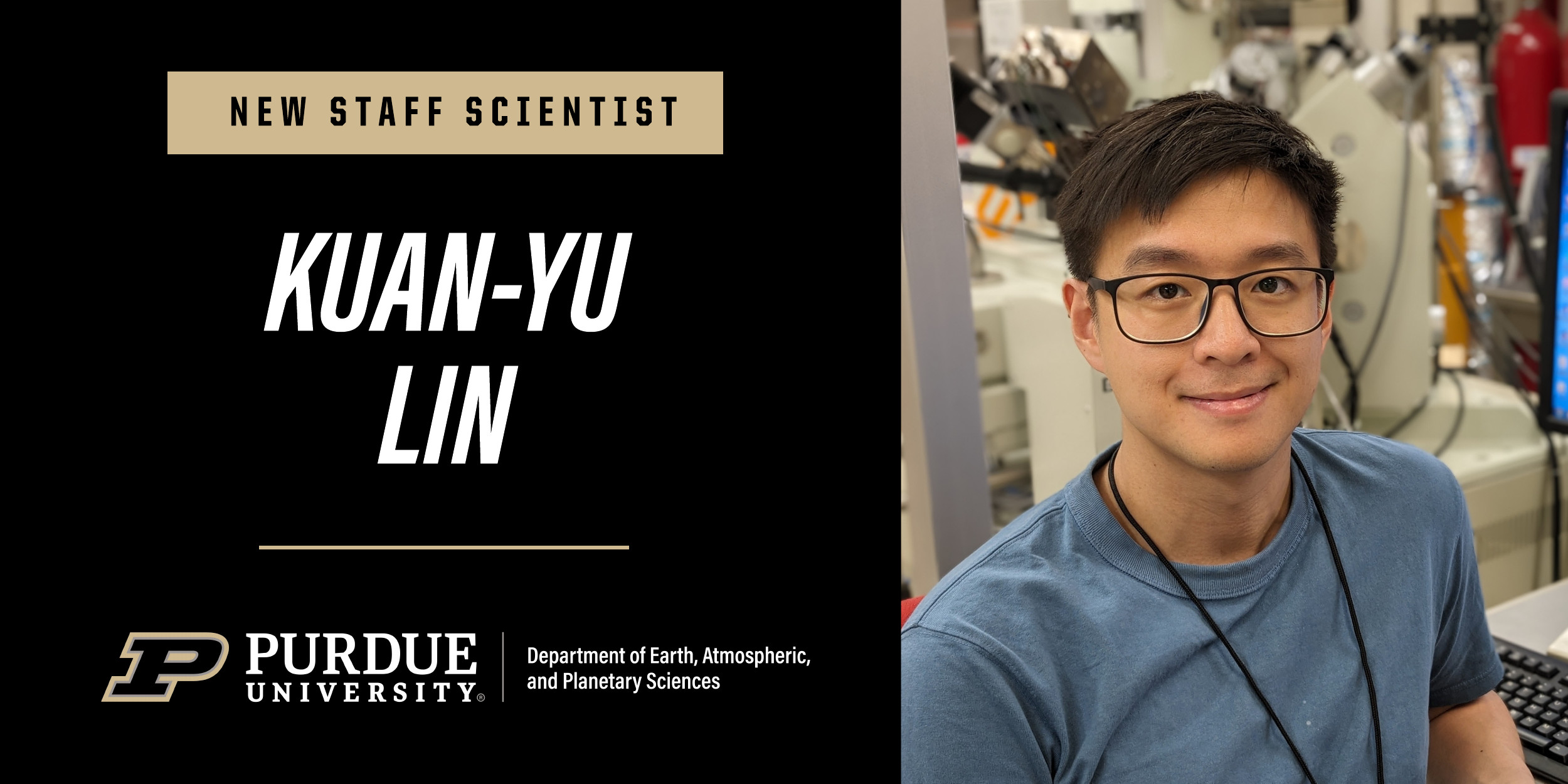Dr. Kuan-Yu Lin joins the College of Science Earth, Atmospheric, and Planetary Science Department
11-03-2025

The Department of Earth, Atmospheric, and Planetary Sciences (EAPS) at Purdue University welcomes Dr. Kuan-Yu Lin on campus as a new staff scientist in the fall of 2025. Lin’s work will focus on operating and optimizing a new state-of-the-art electron probe microanalyzer (EPMA) that will serve as a shared research tool hosted at Purdue University’s Electron Microscopy Center.
The instrument, purchased through Purdue Resources Empowering Coordinated Investigations for Sample Exploration (PRECISE), a NASA-funded grant, will enable scientists to analyze the chemical composition of materials at microscopic scales, advancing studies in fields such as Earth, planetary, material, and biological sciences. Lin will train students and postdoctoral researchers on the instrument, helping expand Purdue’s growing capabilities in high-resolution geochemical analysis.
“I will assist many users from EAPS, broader Purdue, and external communities on our new electron microprobe, which is a new state-of-the-art instrument purchased through NASA’s Planetary Science Enabling Facilities program,” Lin said. “This instrument will facilitate a lot of research at EAPS, Purdue, and beyond.”
Lin’s personal research focuses on understanding how ocean basins form by studying the chemical makeup of rocks collected from the seafloor. He participates in month-long ocean expeditions to collect rock samples from different parts of the world’s oceans, using dredging and deep-sea drilling techniques.
Originally from Taiwan, Lin said life in West Lafayette feels quite different from where he grew up with. “I’m born and raised in Taiwan, which is very different from West Lafayette in many ways,” he said. “Instead of cold, windy winters, Taiwan is very humid, hot, and have tropical cyclones in the summer. We are also covered with high mountain ranges higher than 10,000 feet. Earthquakes also occur very frequently.”
Lin said he was drawn to Purdue because of its collaborative research culture and welcoming environment. “I really enjoy the collaborative atmosphere between different departments and centers here at Purdue, which I got a strong sense of during my interview,” he said. “I also love the pace of life here.”
Lin earned his undergraduate degree in Earth Sciences and Chemistry from National Cheng Kung University in Taiwan. He completed a master’s in Geosciences at National Taiwan University, where he began using electron beam techniques to analyze rock compositions. He went on to earn his PhD in Marine Geology from the University of Delaware and was later awarded a postdoctoral fellowship at the Smithsonian’s National Museum of Natural History in Washington, D.C.
His experience at the Smithsonian enhanced his expertise in EPMA, which now forms the basis of his role at Purdue. One of Lin’s career highlights came during an ocean drilling expedition through the International Ocean Discovery Program that made international headlines.
“One of the ocean drilling cruises I sailed on recovered the longest intact section (1268 m) of rocks that originated from the Earth’s mantle,” Lin said. “We published the preliminary results in Science, and the article was featured across many media platforms, more noticeably the New York Times, within which you can find photos of me and my colleagues investigating drill cores.”
Outside of research, Lin enjoys hiking, exploring unusual rocks and minerals, cooking, and reading. “I’m excited to be part of Purdue’s growing research community,” he said. “It’s inspiring to work with people whom I share the same passion about science and discovery.”
About the Department of Earth, Atmospheric, and Planetary Sciences at Purdue University
The Department of Earth, Atmospheric, and Planetary Sciences (EAPS) combines four of Purdue’s most interdisciplinary programs: geology and geophysics, environmental sciences, atmospheric sciences, and planetary sciences. EAPS conducts world-class research; educates undergraduate and graduate students; and provides our college, university, state and country with the information necessary to understand the world and universe around us. Our research is globally recognized; our students are highly valued by graduate schools and employers; and our alumni continue to make significant contributions in academia, industry, and federal and state government.
Written by: David Siple, communications specialist, Department of Earth, Atmospheric, and Planetary Sciences at Purdue University